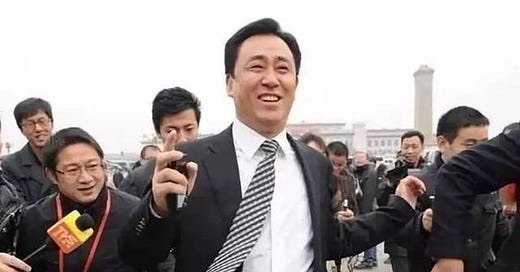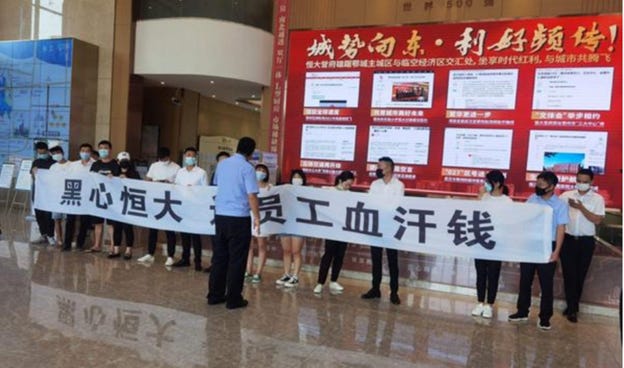Source: Blue Diamond Stories (蓝钻故事)
“In a deserted hall, once tablets were lining the bed;
Where withered grass and bare poplars stand, music and dance once rang.”
—Cao Xueqin (曹雪芹), Dream of the Red Chamber (《红楼梦》)
【Editor's Note: Xu Jiayin, founder of Evergrande, rose from humble beginnings in 1997 to create a real estate empire that became China’s largest developer. Using aggressive tactics like leveraging debt and rapid sales, he capitalized on China's real estate boom, achieving monumental success despite financial crises in 1997 and 2008. Evergrande's opulent projects and Xu’s extravagant lifestyle, including private clubs and a personal “elevator-guard boy band,” symbolized his towering ambition. However, this ascent was precariously built on unsustainable borrowing, culminating in Evergrande’s collapse in 2021 under $2.5 trillion of debt—the largest in history. The downfall exposed the fragility of China’s property-driven economy, leaving abandoned projects and despairing homeowners in its wake. Once celebrated as China’s richest man, Xu now faces public disgrace and detention, emblematic of unchecked ambition turned catastrophic. His story reflects the perils of overreach in an industry fueled by speculation and systemic risk.】
Fear of Heights
In 1997, Xu Jiayin (许家印) was thirty-nine. He had been venturing south for five years in pursuit of his dream, earning a monthly salary of 3,000 yuan.
He and his wife, Ding Yumei (丁玉梅), their two sons, his mother-in-law, his father, and a friend were co-renting a two-bedroom apartment. Only the roommate’s bedroom had an air conditioner.
His son was so afraid of the heat that he lay on the floor right outside the roommate’s bedroom door, relishing the cool air and calling out, “It’s nice and cool here!”
That same year, standing on the threshold of forty, Xu Jiayin decided to “raise the banner in revolt” and founded Evergrande Real Estate (恒大地产).
Perhaps out of guilt toward his wife, who prepared meals every day, Xu Jiayin established the Guangzhou Evergrande Industrial Group Co., Ltd. (广州恒大实业集团有限公司) with Ding Yumei as its sole shareholder, chairperson, and general manager.
Nineteen ninety-seven was the year Hong Kong (香港) returned to China—and also the year of the Asian Financial Crisis.
Hong Kong movie star Kenny Bee (钟镇涛) had tried his hand at property speculation, borrowing HK$145 million at high interest to enter the then-booming real estate market.
But the day after Hong Kong’s handover, George Soros, the “financial vulture,” successfully devalued the Thai baht. The financial storm rolled in, and within months, Hong Kong home prices plummeted by fifty percent. Overnight, Kenny Bee lost everything, ending up HK$250 million in debt.
In Guangzhou (广州), spooked by the financial crisis, a subsidiary of a local branch of the Industrial and Commercial Bank sat on a plot of land belonging to the Guangzhou Pesticide Factory, too wary of developing it, ultimately selling it off at a low price. Xu Jiayin, who had just set up Evergrande, jumped in: “I’ll take that lot!” The remarkable thing was that his pockets were even emptier than his forty-year-old face looked. “If a person has no money but wants to do great things, what’s to be done?” Over the years, Xu Jiayin would keep reproducing that same “wolf-from-thin-air” tactic: making concessions on price in exchange for phased payments.
Once he secured the land, he got a 6 million yuan bank loan—5 million went to the initial payment on the land, while 1 million was left for company operations. As for construction, he let the building contractor shoulder 50% of the costs.
As soon as the first floor was completed, they began selling units. In half a day, they had sold 80 million yuan in property. Acquiring the plot and selling everything off took only a year, creating a real-estate legend that rocketed Evergrande into the limelight.
The financial crisis was mirrored by a wave of state-owned enterprise reforms and the resulting “laid-off workers,” which forced further policy changes.
To stimulate domestic demand, the government took a “three-pronged” approach, full steam ahead. Beyond expanding college enrollments, there were two other major measures: market-based healthcare reforms and an end to employer-subsidized housing. The latter meant a complete marketization and monetization of real estate—transforming it into a pillar industry.
—In November 1997, top leadership had a classic exchange with Wang Shi (王石) over whether real estate could become a pillar industry, widely regarded as the bugle call to the 1998 housing reform: “Within two years, I am determined to make the housing sector a pillar industry.” “Since ZL says so, it’s bound to succeed.” When that discussion wrapped up, the room burst into laughter. Nobody imagined that right after The Happy Life of Poor Zhang Damin (《贫嘴张大民的幸福生活》) finished airing on TV, the “snail home” era of soaring prices—à la Dwelling Narrowness (《蜗居》)—was about to arrive.
In 1998, Xu Jiayin paid the sky-high sum of 134 million yuan for 53,000 square meters near that old pesticide factory lot and rolled out an entire series of thirteen “Jinbi (金碧)” complexes—Jinbi Garden, Jinbi Mansion, Jinbi Bay, and so forth—all resounding successes. Within six years, Evergrande had muscled its way into China’s top 500. He finally no longer had to feel guilt toward his wife.
Playing “Beat the Landlord”
In 2008, Xu Jiayin became the country’s leading land baron, but he unfortunately found himself in the midst of his second international financial crisis.
Evergrande had expanded too far, and the capital chain was broken. At the time, they were over 10 billion yuan in debt, which pales in comparison to the current 2.4 trillion, but back then, it was enough to scare him half to death.
People in those days were still somewhat naive; they didn’t dare take on huge leverage quite so fearlessly, and that debt of over 10 billion left Xu Jiayin terrified.
In desperation, he flew to Hong Kong and holed up at a mansion on 12 Seaview Promenade in Repulse Bay. There, he played a few rounds of “Beat the Landlord” (锄大D) with his card buddies—Cheng Yu-tung (郑裕彤), Albert Yeung (杨受成), Joseph Lau (刘銮雄), and so on. Low-stakes gambling on the table, high-stakes deals off the table. Amid friendly banter, those friends pulled out real cash and successively invested in Evergrande.
When the game ended and dawn broke, Xu Jiayin answered a phone call to hear that his younger associates had already pulled him out of trouble. Evergrande had narrowly escaped disaster.
Rebounding from the bottom, he soared to become China’s richest man. Lord Xu reveled in his success, hosting a grand feast at the ultra-five-star Evergrande Royal Scenic Peninsula Hotel. The guests included not just wealthy tycoons but also major celebrities—among them Chan Kong-sang (陈港生, known as Jackie Chan) and Fan Bingbing (范冰冰)—all vying for favor. Brimming with confidence, Xu Jiayin shouted, “Does anyone not have red wine in front of them? Bring it out!”
Twice, he had ridden out a financial meltdown and even risen to dizzying heights; it instilled in him an unshakable conviction.
Xu firmly believed, “Home prices will never fall”—the same creed held by many in Hong Kong.
He scored his first big success in 1997 and played “Beat the Landlord” in Hong Kong in 2008. Naturally, even under the “housing is for living, not for speculation” policy tone of 2016, Xu kept expanding with unbridled ambition.
In 2008, he became China’s richest man, perched precariously atop the world, and soon delved into the entertainment industry—forming his own singing-and-dancing troupe.
Meanwhile, Bai Shanshan (白珊珊), born in 1989, had just made her debut on the CCTV New Year’s Gala stage.
Forty-Two Floors
In 1997—the year Evergrande first rose to prominence—billionaire Shi Yuzhu (史玉柱) was in dire straits, so broke he could hardly afford gas. He, too, had succumbed to the Mainland’s booming property market, pouring most of his assets into real estate by planning a 70-story “China’s tallest building,” the Giant Tower. Then his funding chain snapped after completing just three floors, leaving an unfinished hulk and a debt of 250 million yuan. Years later, Shi would ride high once more, thanks to his “Brain Platinum,” touted in the slogan “This year, don’t buy gifts for Mom and Dad.” Returning to the same Pearl River Delta where he had once failed, he mandated that the new R&D building never exceed three floors—“because I’ve developed acrophobia.”
Xu Jiayin never had acrophobia; he just wanted to fly higher, to soar into the clouds. Evergrande loves to build tall. Its headquarters boasts 43 floors, with Lord Xu on the top, peering down upon the mortals below.
But occupying the top floor leads to an awkward scenario: one often shares an elevator with people from below, which is hardly dignified when crowds gather—too many eyes and ears. In response, Evergrande assembled a 20-plus-person “elevator-guard boy band,” each earning 300,000 yuan a year. When Lord Xu steps into the elevator, they rush in to clear it, blocking employees or outsiders from entering.
They control the elevators at Evergrande HQ and flank Xu whenever he goes out. They resemble the yamen bailiffs of old, wielding “Make Way” placards and bellowing at bystanders to disperse.
One wonders: just what are these lackeys shielding him from? Why impose such hush and distance? After Evergrande’s collapse, a leaked document called “Evergrande Group’s Comprehensive Guest Records for All Levels of Leadership” showed extensive notes on Lord Xu’s daily preferences. The first three items were as follows:
He doesn’t like crowds when entering a hotel.
Wherever he goes, the elevator must be reserved for him.
Apart from his secretary, bodyguards, and personal attendants, no one—especially men—is allowed too close.
Regarding Xu Jiayin and his entourage, Ma Weidu (马未都) once shared a story. He and Xu had an agreed-upon meeting time. Ma arrived, but Xu sent word: “Oh, Master Ma, please wait for me in the lobby. I’m working out right now.”
So Ma waited. Five minutes later, Xu Jiayin strode in wearing exercise gear, brimming with energy. As he neared, he shrugged his shoulders, and snap—his coat slid off, landing perfectly in the arms of an attendant right behind him.
He sat down across from Ma, raised his hand, and a cigar was placed precisely between his fingers. A quick flick—lit.
He took a few puffs, tilted his hand back, and an aide promptly took the cigar, tapped off the ash, and then slipped it back into Xu Jiayin’s waiting hand at the next gesture.
Coolly, Xu said to Ma, “Ordinary people just work out blindly. But I hired an American trainer from the U.S.”
It’s the swagger of a Triad boss. No doubt he picked up pointers during those Hong Kong card sessions.
With this gang of henchmen, Evergrande sealed itself off from outside contact, keeping Lord Xu away from “riffraff”—especially the men he disliked.
Above the 40th floor at Evergrande HQ, security is tight. Employees can’t roam freely, evoking an imperial palace of old.
Lord Xu occupies the 43rd floor. The 41st is where Evergrande’s top management works (and houses various entertainment facilities). The 42nd is an exclusive high-end private club. Apart from Xu Jiayin, his secretaries, bodyguards, and personal attendants, everyone else who goes there is either supremely rich or supremely powerful—and it’s also a place of song and dance: the domain of the Evergrande Song and Dance Troupe.
Xu Jiayin has always disliked having anyone above him.
Buy, Buy, Buy; Big, Big, Big
In Chinese real estate, you can get by without knowing much else, but you must understand your customers.
Evergrande excels at hosting and catering to clients. In the past, if a customer liked a particular type of car, they’d buy it just for the occasion and then sell it.
Xu Jiayin not only understands cars and hospitality but also loves to use double words. During the 2019 Evergrande Auto press event, he scrawled a dramatic list:
freestar
“Buy, Buy, Buy, Merge, Merge, Merge, Encircle, Encircle, Encircle, Big, Big, Big, Good, Good, Good!”
And so, you see, whenever gossip swirled about him and some woman, the name turned out to be “Bingbing” or “Shanshan.”
The Evergrande Song and Dance Troupe adopted an upscale approach. Its requirements for new members are strict: they must be at least 170 cm tall and no older than twenty. Dating within the troupe is also strictly prohibited.
Bai Shanshan, the group's leader, is 177 cm tall and once won first place in the Guangdong division of the China Model Star Competition. In 2016, after performing at Evergrande’s 20th-anniversary celebration, she posted multiple “expressions of gratitude” on Weibo.
In 2020, Ren Zeping (任泽平), then Evergrande’s chief economist, published an article urging the government to lift restrictions on having a third child. That same policy was enacted the following year. But when Ren cautioned Xu Jiayin about blindly expanding into automobiles, mineral water, and other industries, he was criticized for “lacking vision.”
In September 2021, Evergrande defaulted with total debts of 2.5 trillion yuan. Overnight, Lord Xu plunged from being the richest man to the “most indebted.” That 2.5 trillion—an unheard-of figure—stunned the world, terrified his fellow townspeople, and toppled the 42nd floor. After Evergrande’s crash, Bai Shanshan purged her entire Weibo feed, and the song-and-dance troupe scattered like birds and beasts.
Later, Bai Shanshan angrily issued a statement refuting rumors, claiming she was just a normal dancer who had never done anything outside her job. She dismissed claims of an 8-million-yuan salary as fabrication, and as for the Shenzhen Bay No.1 residence listed at 150 million yuan, plus a car and a yacht, she said all of that was on record. She accused netizens of kicking her when she was down and declared she had reported the rumors to the authorities.
Her next public appearance was at her wedding.
Rumor has it that Bai Shanshan married real estate magnate Li Yunhao (李云浩), fulfilling her dream of “marrying into wealth.”
Property developers have always put faith in feng shui, from Hong Kong tycoons to American President Donald Trump.
Xu Jiayin also believed in feng shui. In 2016, he spent a fortune hiring a feng shui master to build a highly lavish ancestral tomb—a twelve-mu cemetery complete with imposing gates and walls.
Yet his knowledge of fate proved inadequate. He missed a detail that a certain master by West Lake (西子湖) had supposedly foretold a thousand years ago: if someone surnamed Xu (许) unites with someone surnamed Bai (白), it won’t end well.
Sure enough, after the waters flooded Jinshan Temple (水漫金山), Leifeng Pagoda (雷峰塔) finally toppled.
The Building Collapses
In this world, wealth and beauty often go hand in hand. But wealth is perpetually in flux, whereas real estate once seemed so steadfast.
In China, an apartment is a prerequisite for marriage, an obsession for one’s in-laws, and the symbol of all that is worldly.
Back in 1979, Mainland leaders invited Hong Kong businessman Henry Fok (霍英东) to invest in building a hotel in China, but he didn’t dare accept and only offered more donations. He later recalled:
“At the time, I was afraid the policy might change abruptly. The only thing that reassured me was a painting of a nude woman at the Beijing Capital Airport.”
For twenty-six years, as Xu Jiayin built his empire, his desire likewise kept inflating. Countless people poured themselves into this seemingly solid mirage of wealth, constructing his towers ever higher.
We saw him rise to lofty skyscrapers. We saw him fete his guests. And we saw those buildings collapse.
That timeless saying applies to Xu Jiayin—except, in his case, it’s leveraged, just like his real estate ventures.
These towers weren’t ordinary towers; they belonged to “the number-one property developer in the universe.” These guests were not ordinary guests; they were monstrous powerbrokers and stunning dancers of unmatched beauty. And this collapse was no ordinary collapse; it was a 2.44 trillion yuan debt that tore the very sky asunder.
Pictures of “Brother Belt,” beaming in the spring breeze, still flood the internet as though it were all yesterday. But in a blink, circumstances change. The wealthy lose their fortune, beauties drift away, and what was once “forever grand” turns to moonlight in water or flowers in a mirror—just like the “Burial of the Flowers Song” in Dream of the Red Chamber.
“All the world praises the bliss of immortals, but a lovely wife is hardest to leave behind!
Day by day, you speak of devotion; yet in death, she follows someone else.”
In the Jin dynasty, there was a magnate named Shi Chong (石崇). He loved to flaunt his wealth and his dancers. When his building collapsed, a dancer named Lüzhu (绿珠) leaped off it in gratitude for his patronage.
But when Xu Jiayin’s “building” fell, the high-priced starlets, confidants, and old friends for whom he had paid fortunes all fled like scattered birds. Day by day, you speak of devotion, yet in death, they follow someone else.
The roiling commercial dramas vanish like smoke. All that remains is the harsh reality. Those who jumped from his doomed buildings were the owners of his half-built, abandoned towers—people who once put their faith in him.
This translation is an independent yet well-intentioned effort by the China Thought Express editorial team to bridge ideas between the Chinese and English-speaking worlds. The original text is available here:
https://www.backchina.com/news/2025/01/23/954602.html
Kindly attribute the translation if referenced.







